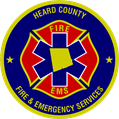


Heard County Fire & Emergency Services
11816 HWY 100
Franklin, GA 30217
Phone: (706) 675-6186 (TTY 711) Fax: (706) 675-3195
11816 HWY 100
Franklin, GA 30217
Phone: (706) 675-6186 (TTY 711) Fax: (706) 675-3195

FIND US ON:
EMAIL US:



9-1-1 Information
WHAT IS 9-1-1?
9-1-1 is the national standard for the sequence of numbers to dial on a telephone to report an emergency. Dialing 9-1-1 is the fastest, easiest way to communicate with your local Emergency Services (Police, Fire, or Ambulance) during an emergency. You do this by simply waiting for the dial tone on your telephone, cellular phone or public telephone, then dialing 9-1-1. Please take note that no money is needed for calling 9-1-1 from a pay phone. If there is an emergency, you can just pick up a pay phone, wait for a dial tone, and dial 9-1-1 without depositing a coin. When you dial 9-1-1, your call goes to a dispatcher (telecommunications operator) who dispatches the proper help to you.
Heard County is fortunate to have an Enhanced 9-1-1 System that immediately provides a 9-1-1 dispatcher with the location/address, phone number, and name of the person to whom the telephone number is listed or where the call is coming from.
Heard County is fortunate to have an Enhanced 9-1-1 System that immediately provides a 9-1-1 dispatcher with the location/address, phone number, and name of the person to whom the telephone number is listed or where the call is coming from.
The 9-1-1 Emergency System makes an important difference in our community everyday. It is your first source of help in times of crisis and it can mean the difference between life and death. When used properly, 9-1-1 saves seconds and those seconds can save lives.
WHEN TO DIAL 9-1-1:
An emergency is when immediate police, fire department or medical assistance is necessary to protect life or property. If an emergency situation arises - a crime, a fire, a serious injury or illness - ask yourself whether Police, Fire Department, or Medical Assistance is needed right now to protect life or property. If Yes, then immediately dial 9-1-1 and advise the 9-1-1 Operator of what has happened or is happening. If you are not sure it's a real emergency, dial 9-1-1 and the 9-1-1 Operator will make the final determination.
If the 9-1-1 System receives several calls at the same time, Emergency Services handle these multiple calls on a priority basis. The most serious emergency will be handled first.
If the 9-1-1 System receives several calls at the same time, Emergency Services handle these multiple calls on a priority basis. The most serious emergency will be handled first.
WHEN CALLING 9-1-1:
•
For a Police Call: If you are reporting a crime, pay attention to the suspect's physical characteristics and clothing and if there is a vehicle involved. Get a good description of the vehicle by C-Y-M-B-A-L-S (Color, Year, Make, Body style, Additional information, License, and State).
•
For a Fire Call: If you are reporting a fire, tell the 9-1-1 Operator what is on fire. Give exact address and location, if anyone is in danger, or if anyone is in the structure, or if there is a danger of explosion from combustibles.
•
For Medical Emergencies: If you are reporting a medical emergency, give the same name and address information as on other 9-1-1 calls. Describe the medical problem in some detail and be prepared to answer questions from the 9-1-1 Operator (For example: Is the person breathing? Is the person conscious? Is the person next to you?). This will help to clarify the type of call. Be prepared to be given first aid instructions to help the person until help arrives.
NON-EMERGENCY SITUATIONS:
Do not dial 9-1-1 for Non-Emergency Situations. For Non-Emergency Situations such as noisy neighbors or stolen hub caps, use our Non-Emergency phone line (706-675-3328), never 9-1-1.
Never tell a 9-1-1 operator that a situation is more serious than it really is. It is against the law to intentionally and knowingly give false information to the Police or Emergency Services. Abuse of 9-1-1 may delay someone else's access to Emergency Assistance.
Never tell a 9-1-1 operator that a situation is more serious than it really is. It is against the law to intentionally and knowingly give false information to the Police or Emergency Services. Abuse of 9-1-1 may delay someone else's access to Emergency Assistance.
When you are faced with an emergency situation, do your best to STAY CALM. Give your name, location, and the nature of the Emergency to the 9-1-1 Operator. Be sure to listen carefully to the 9-1-1 Operator and answer their questions as accurately as possible, speaking as clearly and slowly as you are able. Often times you will be asked to describe your problem in some detail.
For Example:
For Example:
Do your best to do exactly as the 9-1-1 Operator tells you during the course of the call and make sure that you never hang up on the 9-1-1 Operator until you are told to do so. If you hang up and redial, your call will go to the end of the line of people waiting for service.
•
Don't call 9-1-1 when the weather is threatening. Watch television, go online, or listen to the radio for weather information. You can also sign up for the county emergency notifications with Code Red by clicking here.
•
Don't call 9-1-1 to test it. Our 9-1-1 Operators will have to take time to call you back and verify if you have an emergency.
•
Don't call 9-1-1 to see how much your traffic ticket is. You can call the Probate Court at (706) 675-3353 for this.
•
Don't call 9-1-1 to check on someone in jail. You can call the Sheriff's Office at (706) 675-3329 for this.
•
Don't call 9-1-1 to get phone numbers to other county departments.
•
Don't call 9-1-1 when the power goes off. Call your utility company.
•
Don't play with 9-1-1 or make false calls. It is a violation of the law, punishable by fine or imprisonment.
Instances where you should not call 9-1-1:
© 2020 Heard County Government. All Rights Reserved. Created and Administered by the Heard County IT Department.

